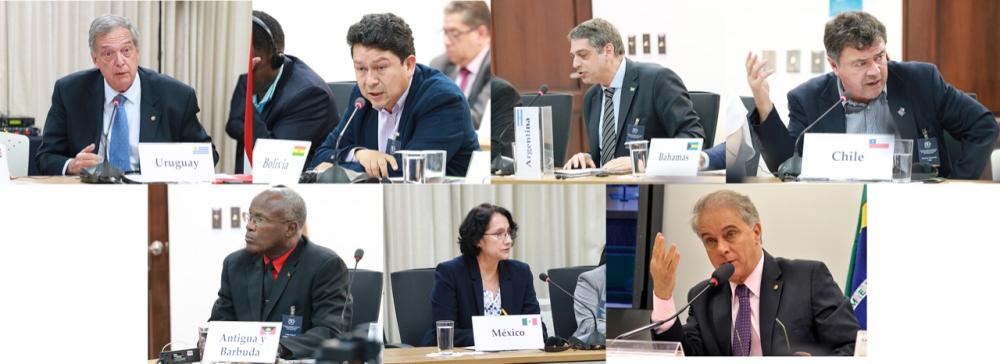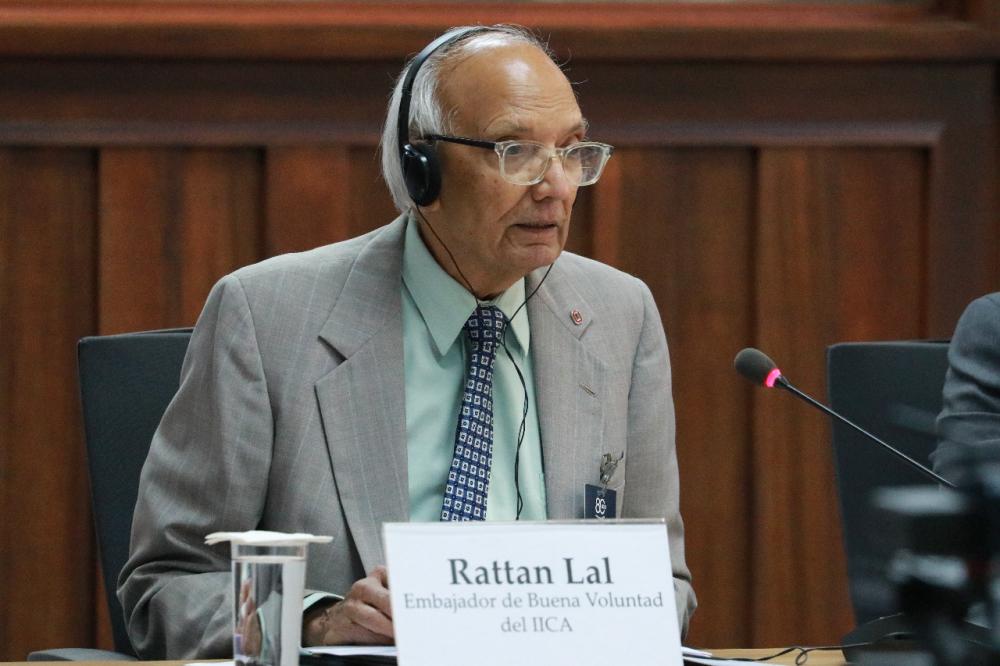Ministers of the Americas highlight the contribution of agriculture to climate change mitigation and its link to food security, urging that it be given a larger platform at COP27

San Jose, 23 September 2022 (IICA) – Ministers and senior officials of more than 30 countries of the Americas who are meeting in Costa Rica emphasized the key role of the agriculture sector of the Americas in global food security; its contribution to climate change mitigation; and its even greater potential, thanks to science and innovation. They also demanded that the sector be given a larger platform at COP27, to underscore its strategic importance.
“We cannot speak about climate change without mentioning agriculture and food production. We must insist that the developed countries adopt a more honest approach and channel resources committed to the developing countries as a matter of urgency and in a practical way. We must remove all food trade barriers, in view of climate challenges and food security”, said Fernando Mattos, the Minister of Agriculture, Livestock and Fisheries of Uruguay.
Furthermore, he said that, “We are in large part responsible for ensuring the supply of food for the world, but continue to be the victims of international agricultural trade, which is increasingly introducing trade barriers to address climate change. This is a challenge, but we must be given a larger platform at COP27, given the importance of agriculture in mitigating climate change”.
Minister Mattos, speaking during the ministerial meeting, “Challenges for Agriculture in the Americas to Address the Climate Crisis”, convened by the Inter-American Institute for Cooperation on Agriculture (IICA), was thereby echoing the appeal made by Juan Carlos Torrico, who was representing Bolivia’s Plurinational Authority of the Mother Earth.
The Bolivian official gave an extensive explanation of the significance of agriculture to the region, emphasizing its family identity, best practices, and its role in natural resource conservation.
“I want to point out that we have been allocated only a limited time during COP27. We will have very few opportunities during the sessions to address the topic of agriculture and we must prepare the national and regional negotiation teams.
I hope that the Presidency of COP will allocate sufficient room to discuss this issue, so that agricultural concerns can be given the time that they require”, said Torrico.
The purpose of the meeting in San Jose, Costa Rica is to discuss the strategic role of the agriculture sector of the region in tackling climate change, in view of the upcoming United Nations Climate Change Conference (COP 27). In addition to the ministers and delegations of the countries of the hemisphere, representatives of multilateral credit organizations and global financial funds were in attendance. Also participating was Rattan Lal, IICA Special Envoy to COP27, who is the world’s leading authority on soil sciences.
Ariel Martinez, representative of Argentina’s Secretariat of Agriculture, remarked that it is critical that the Americas “arrive at COP with a joint strategy”; and he stressed that one of the challenges of the Summit is that in addition to working on climate matters, it addresses the interests of other sectors, such as the new rules in international trade.
Martínez went on to stay that, “In Argentina’s view, these new rules cannot affect the amount of food that we produce. They cannot make trade more unjust, make much of a difference or create greater market concentration. We cannot leave anyone behind, because agriculture is not part of the problem, but the solution”.
Esteban Valenzuela, Chile’s Minister of Agriculture, urged his colleagues not to fall into the “conformity” trap and instead to ensure that they are “committed and come with a project agenda”, so that the agriculture sector will be able to access the necessary financial resources to tackle climate challenges. Valenzuela also highlighted the contributions of Professor Lal to strengthening the position of the region in climate negotiations.
“In order to move forward, we must identify specific priorities that reflect common interests”, added Franklin Witter, Minister of State of Jamaica.
“We are aware that climate change is already here. We must determine what works, where it works, and continuously apply it—in the case of my country, from the perspective of small island farmers”, said Colin O’Keiffe, Permanent Secretary of the Ministry of Agriculture, Fisheries and Barbuda Affairs of Antigua and Barbuda.
Sol Ortíz, Mexico’s Director General of Policy, Prospecting and Climate Change, underscored the need to foster inter-sectoral coordination to develop more comprehensive and systemic short and long-term outlooks. She explained that this would allow for determining “how to address the urgent need to produce more and better in a sustainable manner, without neglecting the need to keep our natural resources and biological systems operating”.
Marcos Montes, Minister of Agriculture, Livestock and Food Supply of Brazil, considered that the meeting gives continuity to efforts undertaken in 2021 in preparation for the United Nations Food Systems Summit. That year, the region developed a joint position and brought agriculture to the forefront, highlighting its key role in resolving the challenges facing humanity.

He also pointed out that the impact of the Covid-19 pandemic, the intensification of extreme weather events and the war in Ukraine have compromised food security, especially in the poorest countries.
In this regard, he called for a more humane outlook on sustainable development, by aligning its economic, social and environmental pillars. “The current narrative seeks to divert attention from fossil fuels—the leading cause of climate change—and place the blame on agriculture. We must work together to challenge that vision by sharing the reality of our agriculture sector”, he stated.
Success stories from the region
Rattan Lal noted that good agricultural practices can help to achieve the global objective of keeping global warming from exceeding pre-industrial levels by more than 1.2 degrees Celsius—a goal that is much more ambitious than what was established by the international community in 2015, through the Paris Agreement.
Among the actions to be intensified, the scientist mentioned the use of renewable energies in agriculture, soil carbon sequestration and the restoration of degraded land. “We must highlight and share success stories of conservation in South American agriculture”, he said.
Lal, an IICA Goodwill Ambassador and Chair in Soil Sciences, spoke in favor of empowering farmers by paying for the ecosystem services they provide on their farms through their good practices.
He added that the region should bring innovative ideas to COP 27, such as combining the ancestral knowledge of the indigenous peoples of the Americas with the latest scientific and technological advances, in order to take better care of natural resources.
Professor Lal, who leads the Living Soils of the Americas program together with IICA, considered that the region should develop a broad agenda of climate change mitigation and adaptation actions related to agriculture. This would enable the region to demand more forcefully that developed countries fulfill their commitment to provide funding in the amount of USD 100 billion per year.
In turn, Otero highlighted the value of building consensus within the region’s agriculture sector, and noted that, without food security, the world will be unable to make production environmentally sustainable. He explained that, to this end, it is crucial to guarantee the continuity of agricultural production and greater dynamism in rural areas.
“This will be agriculture’s COP”, he said, “and, as a continent, it is our responsibility to forcefully convey the message that this sector is key to sustainable development”.
More information:
Institutional Communication Division
comunicacion.institucional@iica.int